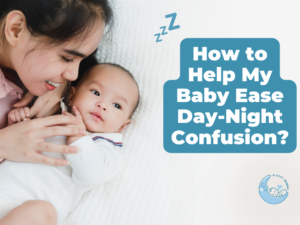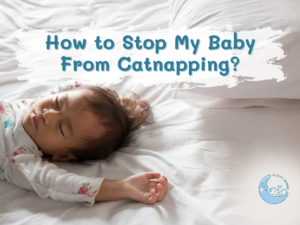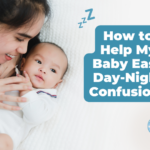Enquire Now with FREE 15 Mins Call
What Should My 6-Month-Old Baby’s Sleep Schedule Be Like?

As your baby reaches the 6-month milestone, their world is filled with curiosity and new experiences. This is a crucial period in a child’s development, where sleep patterns naturally evolve. Parents often wonder about the optimal sleep routines for their little ones during these formative months. One of the common ways is to seek professional help that provides 4-24 months sleep patterns evaluation to help them understand their babies’ sleep better. Let’s explore what to expect and how to establish a suitable sleep schedule for your growing infant.
1. Developmental Milestones
Around 6 months, you may notice your baby reaching various developmental milestones, including expressing interest in their reflection in a mirror, giggling, and laughing, babbling with double consonants like “mama” or “dada”, sitting unassisted with arm support, pushing up with straight arms while on their belly, and blowing raspberries. Every baby develops at their own pace, and these signs of growth and progress can be observed during this period.
2. Number of Naps
Ideally, a 6-month-old should aim for 2-3 naps a day. However, if your baby takes more than three naps due to short durations, it’s important to reevaluate their wake windows to ensure they’re age-appropriate. Around this age, some babies may be ready to drop one of their naps, typically transitioning from 3 to 2 naps. This process can take time and consistency, usually 2 to 4 weeks. Be prepared for flexibility in bedtime as you make this transition, and consider adjusting it as early as 6:30-7:00 pm during this period.
3. Nap Durations
The goal for daytime sleep at 6 months old is 3 to 4 hours, typically divided over 2-3 naps. The length of each nap may vary from day to day, but what matters is the total amount of daytime sleep, separated by age-appropriate wake windows. In managing your little one’s naps, it’s important to keep total daytime sleep under 4 hours and to cap any single nap at 2 hours. This approach helps ensure your baby gets enough active awake time, maintains regular feeding intervals, achieves an ideal bedtime between 7:00 and 8:00 p.m., and promotes consolidated night sleep.
4. Wake Windows
A typical 6-month-old’s wake windows fall within the 2.5 to 3-hour range. Wake windows tend to be shorter in the morning and gradually increase throughout the day as babies grow older. Some 6-month-olds may even be ready to transition from 3 naps to 2, which requires stretching these wake windows closer to 3 hours.
The recommended routine for babies at this age, especially those still on 3 naps, involves wake windows as follows: approximately 2-2.5 hours after wake time is designated for Nap 1, followed by another nap about 2.5 hours after the end of Nap 1, and finally, a third nap approximately 2.5-3 hours after the end of Nap 3, with bedtime scheduled about 2.5-3 hours after the end of Nap 3.
However, for babies who have transitioned to 2 naps, the routine slightly differs, with the wake window extending to about 2.5-3 hours after wake time for Nap 1, followed by a second nap approximately 3 hours after the conclusion of Nap 1, and bedtime scheduled approximately 3-3.5 hours after the end of Nap 2.
5. Ideal Bedtime
The ideal bedtime for a 6-month-old falls between 7:00 and 8:00 p.m. The last wake window of the day, between the last nap and bedtime, should be about 2.5-3 hours. During the transition from 3 to 2 naps, you might need to adjust bedtime slightly. Bedtime can be as early as 6:30 p.m. after the transition as your baby adapts to their new sleep schedule.
6. Engaging Activities
As your 6-month-old continues to grow more interactive and curious about their surroundings, there are several engaging yet simple activities to consider. Encourage hand-eye coordination by providing a container filled with various objects like toys, cups, or blocks for your baby to practice putting in and taking out. Let them sit in front of a mirror to fascinate themselves with their reflection. Introduce toys featuring lights and sounds to capture their attention, and if teething is a concern, offer teething toys with a variety of textures for them to explore. These activities can enhance your baby’s development and keep them engaged.
7. Sleep Regression
While not exactly a sleep regression, some babies may experience sleep difficulties at 6 months due to growth, developmental changes, distracted feedings, separation anxiety, nap transitions, or the introduction of solids. At 6 months old, remarkable growth takes place, encompassing physical, cognitive, and emotional development, with these newfound skills often affecting sleep patterns. Distracted feedings become more common around this age, impacting your baby’s daytime caloric intake and potentially leading to night wakings driven by hunger.
Furthermore, separation anxiety, which typically peaks around 8 to 10 months but may emerge as early as six months, can introduce sleep disturbances. Additionally, sleep issues at this stage may signify your baby’s readiness to transition from three to two naps. If you’ve recently introduced solids and are grappling with sleep challenges, it’s worth considering whether the introduction of solid foods might be contributing to your baby’s sleep difficulties. Consistency and a holistic approach to sleep can help address these challenges.
8. Sleep Training at 6 Months
Babies can be ready for sleep training around 6 months, but the best time is when it suits your family. If you’re considering sleep training, it’s essential to choose the right time for you and your baby. Sleep training can be a beneficial step towards achieving better sleep patterns and helping both you and your baby rest more peacefully. Remember, each baby is unique, and your baby’s sleep schedule may require adjustments based on their individual needs and preferences. If you need further guidance and support, don’t hesitate to reach out to infant sleep training Singapore provided by Sleepy Bubba. A certified baby sleep consultant can ensure that your baby gets the sleep they need for healthy development and a happy family.
Conclusion

In conclusion, understanding and adapting to your 6-month-old’s evolving sleep needs is a vital part of parenthood. From wake windows to nap transitions and nighttime sleep, these early months are a critical foundation for healthy sleep habits. At Sleepy Bubba, our dedicated baby sleep consultant Singapore is here to support you every step of the way. With expert guidance on infant sleep training Singapore and a comprehensive 4-24 months sleep patterns evaluation, you can ensure your child receives the restorative sleep they require for optimal growth and development. By following the recommended guidelines and staying flexible, both you and your baby can enjoy more peaceful nights and well-rested days. If you have further questions or need personalized assistance, don’t hesitate to schedule a 20-minute discovery call with us. Your baby’s sleep journey is unique, and we’re here to make it a restful and fulfilling one.







